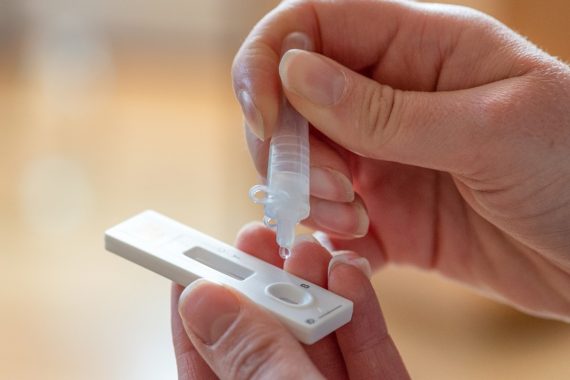GPs asked to remind clinically vulnerable Covid patients to use NHS lateral flow tests

Clinically vulnerable patients who use privately bought lateral flow tests as proof of infection will not be able to access Covid treatments because they cannot register them, GPs have been advised.
The highest risk patients should still access free lateral flow tests via the Government website, make sure they have a stock at home, and will need to report positive tests through gov.uk or 119 to trigger assessment and treatment through Covid Medicine Delivery Units (CMDU).
Patients who have previously been sent at home PCR tests to use should they get symptoms can keep it in case they are asked to use it for surveillance but should be using lateral flow tests to gain access to Covid treatments, a letter updating GPs on the latest guidance outlines.
Most patients should be contacted by a CMDU within 24 hours of a positive lateral flow test being reported but anyone who has not heard anything should contact their GP or 111 for an urgent referral, NHS England says.
Because one of the potential drug treatments, Paxlovid, has multiple potential drug interactions, GPs making referrals need to include a list of medications, the updated guidance says.
‘Patients need to report a positive lateral flow test via gov.uk or 119.
‘This will initiate the process for the local Covid-19 Medicine Delivery Unit (CMDU) to arrange assessment and treatment. Note that only lateral flow tests supplied by UKHSA can be registered. Privately-bought tests cannot be registered,’ a letter to GPs said.
‘In our previous guidance (31 January 2022) we highlighted that a small proportion of patients testing positive who haven’t been automatically contacted by a CMDU for assessment and treatment may need to be referred by GP practices and 111.’
Some charities, including the MS Society, and have raised concerns that vulnerable patients are unaware of the changes to the rules, do not know they can order lateral flows and may be unaware they cannot use a private test to access the treatments.
There have also been worries about patients falling between the gaps at weekends.
A newsletter from Somerset LMC in March had warned that CMDUs ‘were at or exceeding their capacity’ and have asked ‘that only those considered at highest risk of complications are referred so they can respond to GP referrals in a timely manner’.
It is estimated there are 1.3 million people who have conditions that put them at higher risk of severe disease or death from Covid, for example those who have had treatment for cancer recently or who are immunosuppressed.
Once assessed by clinicians at a CMDU, potential treatments include the monoclonal antibody sotrovimab (Xevudy) and the antiviral medicines nirmatrelvir and ritonavir (Paxlovid), remdesivir (Veklury) and molnupiravir (Lagevrio).
Just last week, the Government announced that thousands more patients in England will be eligible for Paxlovid through the PANORAMIC study.
A further 17,500 patients will be recruited through the trial which is open to those over 50 or aged 18 to 49 with an increased risk of severe Covid who test positive for the virus. GPs are also able to direct eligible patients for treatment through this route.
Phillip Anderson, head of policy at the MS Society said: ‘With Covid safety measures scrapped, it’s more important than ever that the 1.3 million people at higher risk from the virus have timely access to antivirals. But concerningly, some people with MS are reporting receiving packs of lateral flow tests with zero explanation, while others are unaware they can’t use a private test to register for antivirals.
‘This is a serious failure of communication by the government, with dangerous consequences. With fewer safety measures in place, those at higher risk no longer have access to the tools they had once used to protect themselves from the virus – and now some are missing out on vital treatment when they test positive. This is simply unacceptable, and we urge the government to end the mass confusion. We need to see an increase in the capacity of COVID medicines delivery units and an awareness campaign to address these issues.’
Jo Nove, acting chief executive at Myeloma UK, said: ‘We’re hearing from myeloma patients who have been denied access to antivirals either because they’ve been wrongly told they’re not eligible for treatment, that their symptoms aren’t serious enough or simply because no one knows how to get their hands on them in the first place. It’s frustrating that more than four months after the antivirals were rolled out, patients are still experiencing these problems and are having to fight for the treatments they are eligible for.
‘The issue of access seems to get worse at the weekend with many left with no choice but to wait until the following Monday. This delay means that some of them end up exceeding the five-day cut-off point to receive antivirals.
‘We would advise myeloma patients and those who are clinically extremely vulnerable to stand their ground if they’re told they’re not eligible. Ask why the person on the other end of the phone thinks you are not eligible for treatment.
‘This can help you know what to do next. And be your own advocate: you are within your right to ask to speak to the telephone operator’s supervisor.
‘Don’t hesitate to call the same number again to talk to someone else. If possible, speak to your consultant, GP, or clinical nurse specialist about the challenges you are experiencing accessing treatments. They may be able to help you.’









